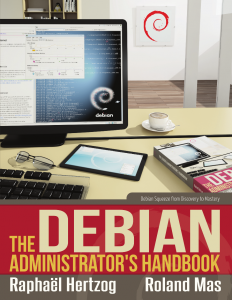
I've just released
git-annex version 3, which stops cluttering
the filesystem with
.git-annex directories. Instead it stores its
data in a git-annex branch, which it manages entirely transparently
to the user. It is essentially now using git as a distributed NOSQL database.
Let's call it a databranch.
This is not an unheard of thing to do with git. The
git notes built into
recent git does something similar, using a dynamically balanced tree in
a hidden branch to store notes. My own
pristine-tar injects data into
a git branch. (Thanks to Alexander Wirt for showing me how to do that
when I was a git newbie.) Some
distributed bug trackers store
their data in git in various ways.
What I think takes git-annex beyond these is that it not only injects data
into git, but it does it in a way that's efficient for large quantities of
changing data, and it automates merging remote changes into its databranch.
This is novel enough to write up how I did it, especially the latter which
tends to be a weak spot in things that use git this way.
Indeed, it's important to approach your design for using git as a database
from the perspective of automated merging. Get the merging right and the
rest will follow. I've chosen to use the simplest possible merge, the union
merge: When merging parent trees A and B, the result will have all files
that are in either A or B, and files present in both will have their lines
merged (and possibly reordered or uniqed).
The main thing git-annex stores in its databranch is a bunch of
presence logs.
Each log file corresponds to one item, and has lines with this form:
timestamp [0 1] id
This records whether the item was present at the specified id at a given time.
It can be easily union merged, since only the newest timestamp for an id
is relevant. Older lines can be compacted away whenever the log is updated.
Generalizing this technique for other kinds of data is probably an
interesting problem. :)
While git can union merge changes into the currently checked out branch,
when using git as a database, you want to merge into your internal-use
databranch instead, and maintaining a checkout of that branch is inefficient.
So
git-annex includes a general purpose
git-union-merge command
that can union merge changes into a git branch, efficiently, without
needing the branch to be checked out. Another problem is how to trigger the
merge when git pulls changes from remotes. There is no suitible git hook
(post-merge won't do because the checked out branch may not change at all).
git-annex works around this problem by automatically merging
*/git-annex
into
git-annex each time it is run. I hope that git might eventually get
such capabilities built into it to better support this type of thing.
So that's the data. Now, how to efficiently inject it into your databranch?
And how to efficiently retrieve it?
The second question is easier to answer, although it took me a while to
find the right way ... Which is two orders of magnitude faster than the
wrong way, and fairly close in speed to reading data files directly
from the filesystem.
The right choice is to use
git-cat-file --batch; starting it up the
first time data is requested, and leaving it running for further queries.
This would be straightforward, except git-cat-file --batch is a little
difficult when a file is requested that does not exist. To detect that,
you'll have to examine its stderr for error messages too. Perhaps
git-cat-file --batch could be improved to print something machine
parseable to stdout when it cannot find a file. Takes some careful
parsing, but straightforward.
Efficiently injecting changes into the databranch was another place where
my first attempt was an order of magnitude slower than my final code.
The key trick is to maintain a separate index file for the branch.
(Set
GIT_INDEX_FILE to make git use it.) Then changes can be fed
into git by using
git hash-object, and those hashes recorded into
the branch's index file with
git update-index --index-info. Finally,
just commit the separate index file and update the branch's ref.
That works ok, but the sad truth is that git's index files don't scale well
as the number of files in the tree grows. Once you have a hundred thousand
or so files, updating an index file becomes slow, since for every update,
git has to rewrite the entire file. I hope that git will be improved to
scale better, perhaps by some git wizard who understands index files (does
anyone except Junio and Linus?) arranging for them to be modified in-place.
In the meantime, I use a workaround: Each change that will be committed to
the databranch is first recorded into a journal file, and when git-annex
shuts down, it runs
git hash-object just once, passing it all the journal
files, and feeds the resulting hashes into a single call to
git
update-index. Of course, my database code has to make sure to check the
journal when retrieving data. And of course, it has to deal with possibly
being interrupted in the middle of updating the journal, or before it can
commit it, and so forth. If gory details interest you, the complete code
for using a git branch as a database, with journaling, is
here.
After all that, git-annex turned out to be nearly as fast as before
when it was simply reading files from the filesystem, and actually faster
in some cases. And without the clutter of the
.git-annex/ directory,
git use is overall faster, commits are uncluttered, and there's no difficulty
with branching. Using a git branch as a database is not always the right
choice, and git's plumbing could be improved to better support it, but it
is an interesting technique.
 This year I take care of organizing of the Debian booth at Chemnitzer
Linux-Tage 2014 which has been approved a few days ago. The CLT is a
yearly (mostly) german speaking Free Software community event which takes
place on the weekend of 15th/16th march in Chemnitz (Germany). On the
Linux-Live pages you find a lot of projects that will have a booth there
and the talk schedule contains many interesting topics. There will also
be a key signing event for which you can register until 11th of march.
The Wiki page for the Event is already in a good shape. Many things are
already organized, but we still have some items left.
A lot of people from the Debian community have already told me that they will
be there. We will have a Debian Wheezy BabelBox demonstration running on a
VirtualBox host that Jan Wagner will provide as well as merchandising
(Thanks to Alexander Wirt).
Two talks from people on our Wiki page have been accepted by the CLT organizers
too:
This year I take care of organizing of the Debian booth at Chemnitzer
Linux-Tage 2014 which has been approved a few days ago. The CLT is a
yearly (mostly) german speaking Free Software community event which takes
place on the weekend of 15th/16th march in Chemnitz (Germany). On the
Linux-Live pages you find a lot of projects that will have a booth there
and the talk schedule contains many interesting topics. There will also
be a key signing event for which you can register until 11th of march.
The Wiki page for the Event is already in a good shape. Many things are
already organized, but we still have some items left.
A lot of people from the Debian community have already told me that they will
be there. We will have a Debian Wheezy BabelBox demonstration running on a
VirtualBox host that Jan Wagner will provide as well as merchandising
(Thanks to Alexander Wirt).
Two talks from people on our Wiki page have been accepted by the CLT organizers
too:
 This year I am able to join the Debian Booth on FOSDEM again. I am also looking forward to meet some projects like foreman and many others. I also hope that I find the time to do some listmaster work, like accepting new lists or getting my new solr based search engine for lists.debian.org online. If you want to meet me, try the debian booth or drop me a short mail or twitter message (@formorer).
This year I am able to join the Debian Booth on FOSDEM again. I am also looking forward to meet some projects like foreman and many others. I also hope that I find the time to do some listmaster work, like accepting new lists or getting my new solr based search engine for lists.debian.org online. If you want to meet me, try the debian booth or drop me a short mail or twitter message (@formorer).
 This is my monthly summary of my Debian related activities. If you re among the people who
This is my monthly summary of my Debian related activities. If you re among the people who  Dpkg
Thanks to Guillem, dpkg with multiarch support is now available in Debian sid. The road has been bumpy, and it has again been delayed multiple times even after Guillem
Dpkg
Thanks to Guillem, dpkg with multiarch support is now available in Debian sid. The road has been bumpy, and it has again been delayed multiple times even after Guillem 
 Everyone loves stats, ok well at least I do. I was doing some research with regards to package maintenance within the
Everyone loves stats, ok well at least I do. I was doing some research with regards to package maintenance within the 
 I've just released
I've just released 
